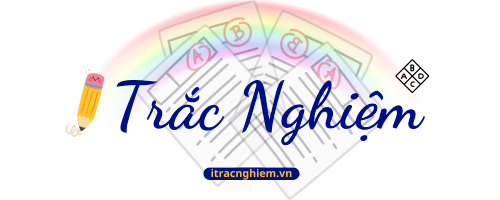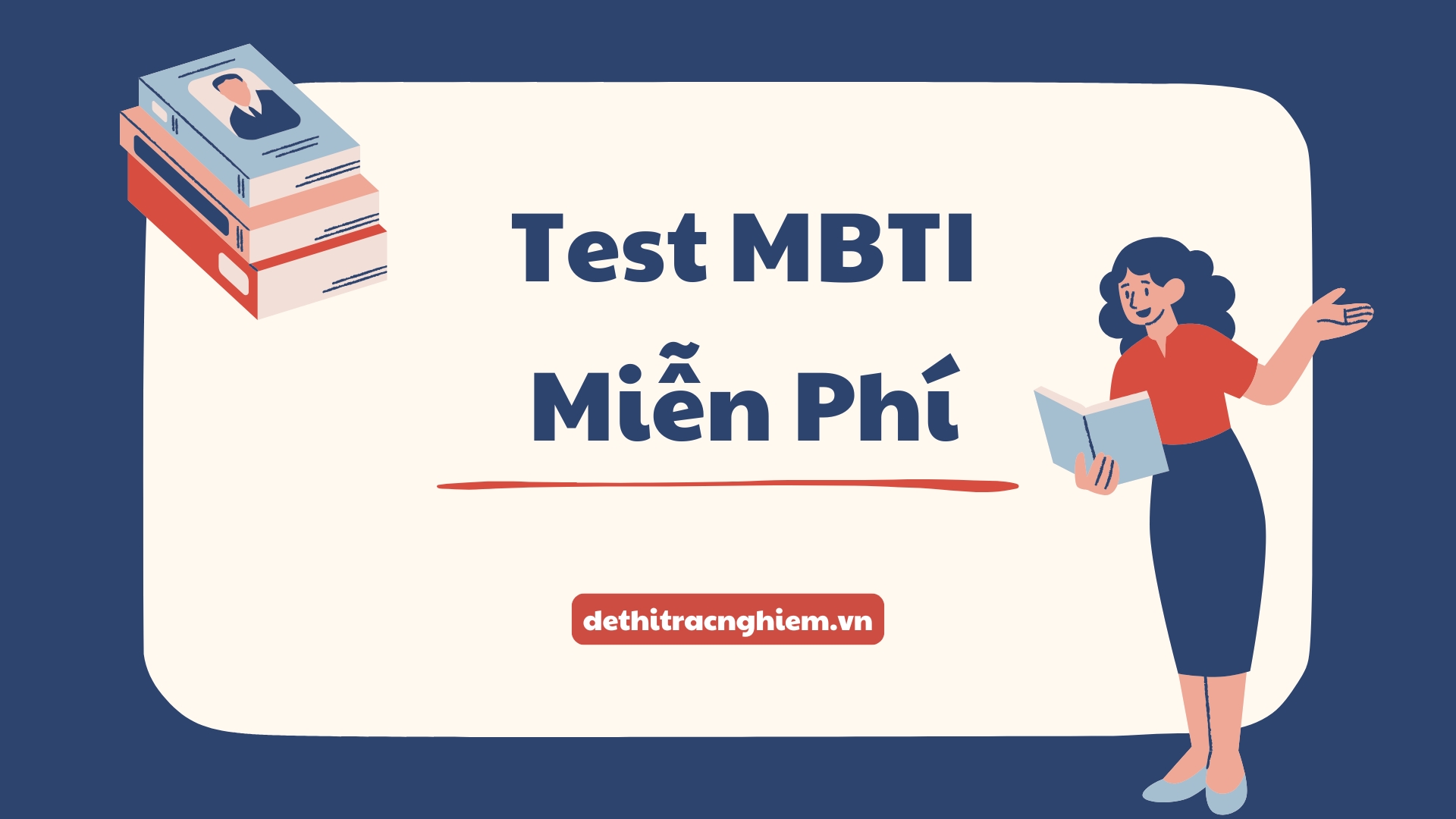Đề thi thử Đại học 2025 môn Tiếng Anh – THPT Chuyên Nguyễn Tất Thành – Kon Tum là một trong những đề tiêu biểu thuộc Tổng hợp đề thi thử môn Tiếng Anh THPT QG, nằm trong chương trình Đề thi vào Đại học. Đây là đề thi thử chất lượng được biên soạn bởi Trường THPT Chuyên Nguyễn Tất Thành – tỉnh Kon Tum, nhằm giúp học sinh lớp 12 có cơ hội cọ xát với cấu trúc đề thi thật và chuẩn bị tốt nhất cho kỳ thi Tốt nghiệp THPT Quốc gia năm 2025.
Đề thi bao phủ đầy đủ các chuyên đề trọng tâm thường xuất hiện trong đề thi của Bộ GD&ĐT như: phát âm – trọng âm, ngữ pháp và từ vựng, đọc hiểu, tìm lỗi sai, viết lại câu và giao tiếp ngôn ngữ. Với mức độ câu hỏi phân hóa rõ rệt từ nhận biết đến vận dụng cao, đề thi không chỉ kiểm tra kiến thức mà còn giúp học sinh rèn luyện kỹ năng xử lý câu hỏi nhanh, chính xác và hiệu quả.
Hãy cùng Dethitracnghiem.vn khám phá đề thi thử này và tham gia làm bài ngay để tự đánh giá năng lực của bạn trước kỳ thi quan trọng sắp tới!
- Số trang: 4 trang
- Hình thức: Trắc nghiệm
- Thời gian làm bài: 50 phút (không kể thời gian phát đề)
ĐỀ THI THỬ ĐẠI HỌC MÔN TIẾNG ANH NĂM 2025 THPT CHUYÊN NGUYỄN TẤT THÀNH – KON TUM
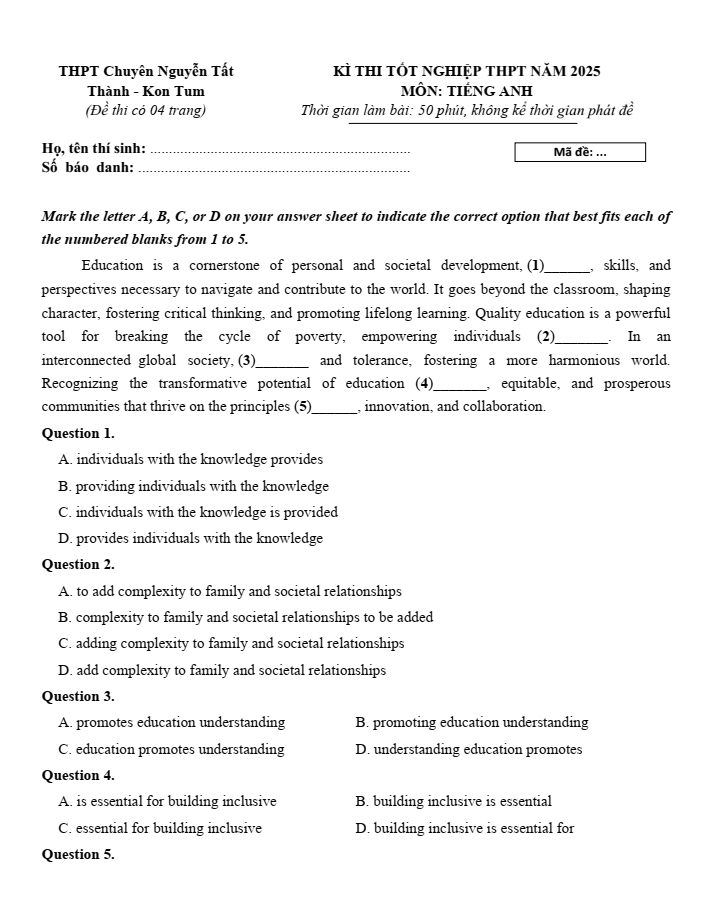
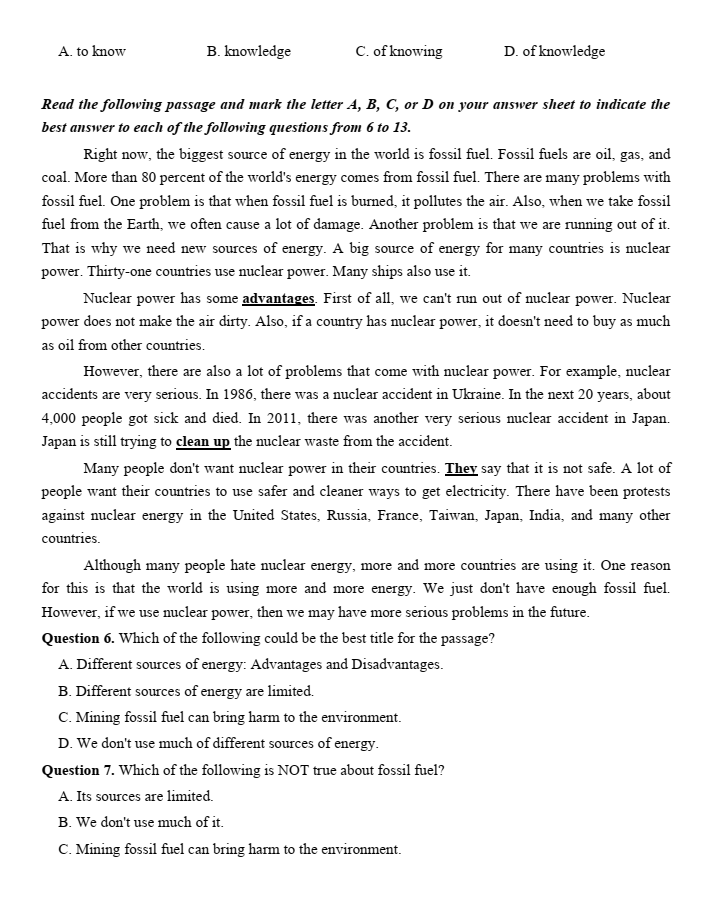
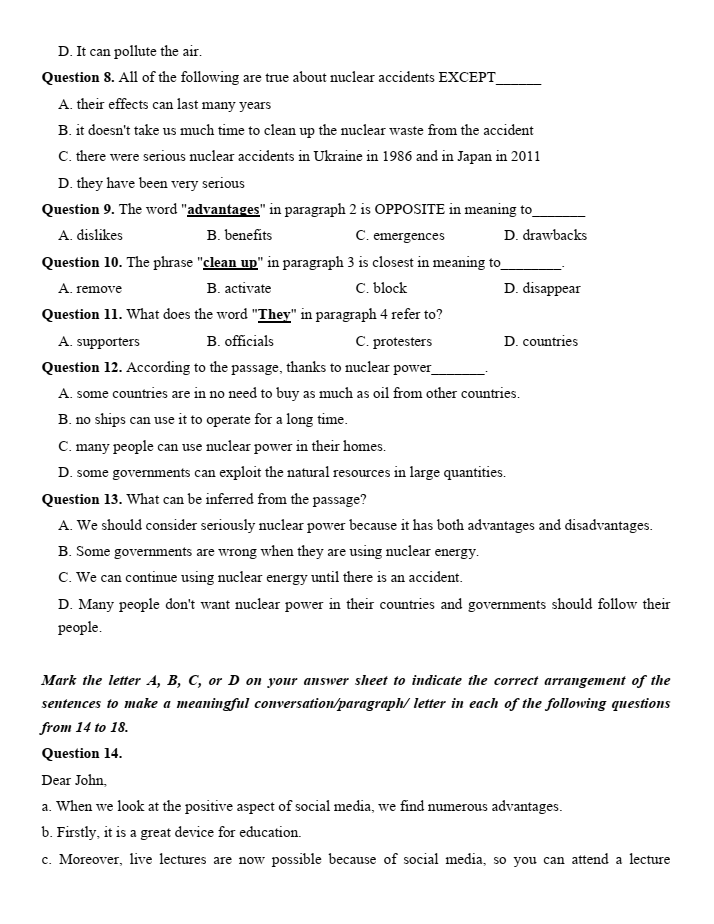
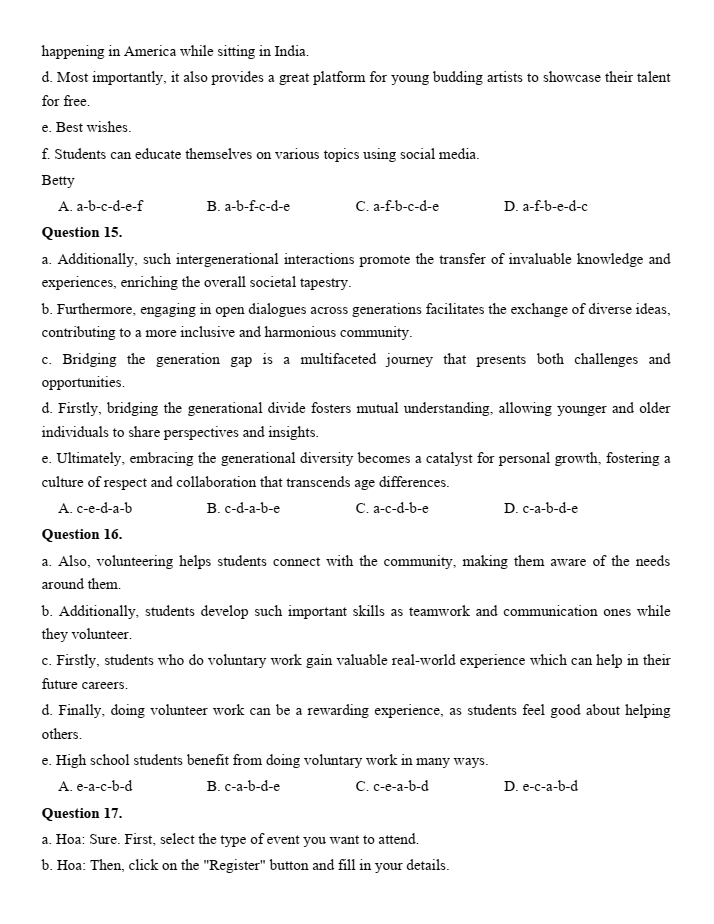
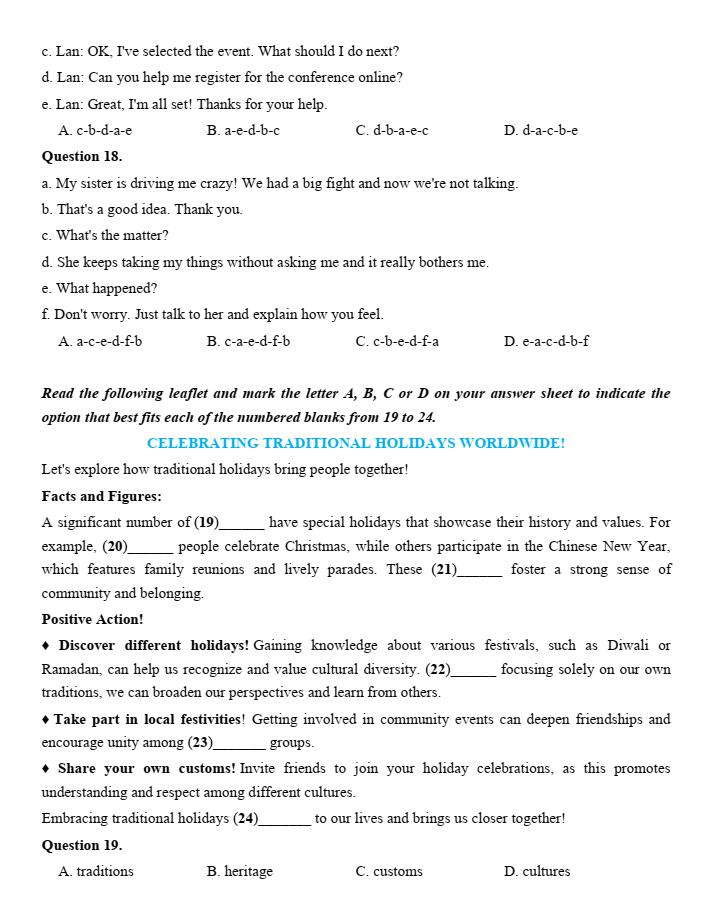
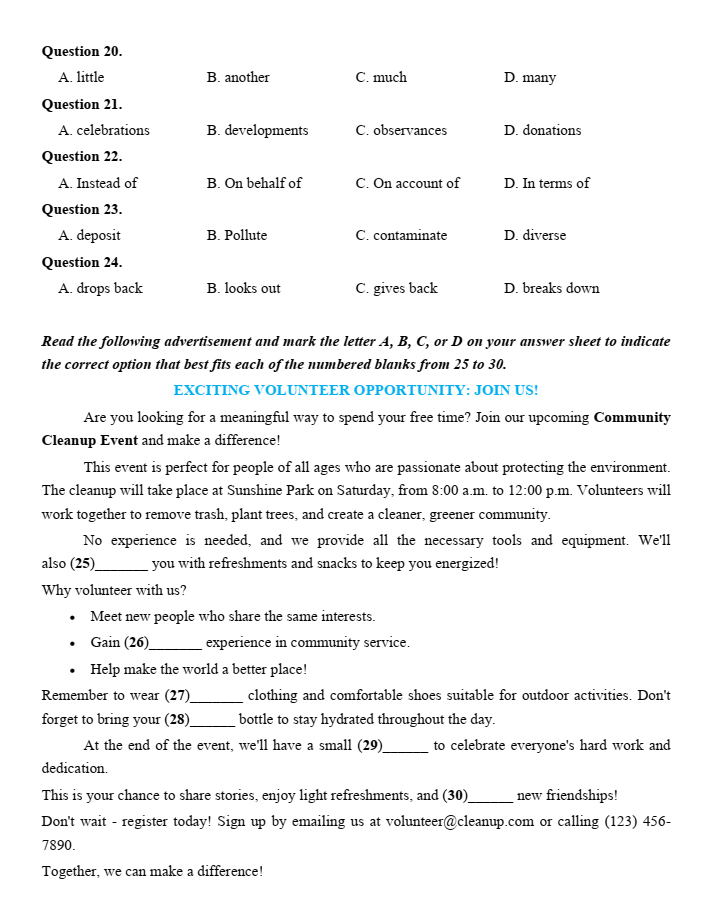
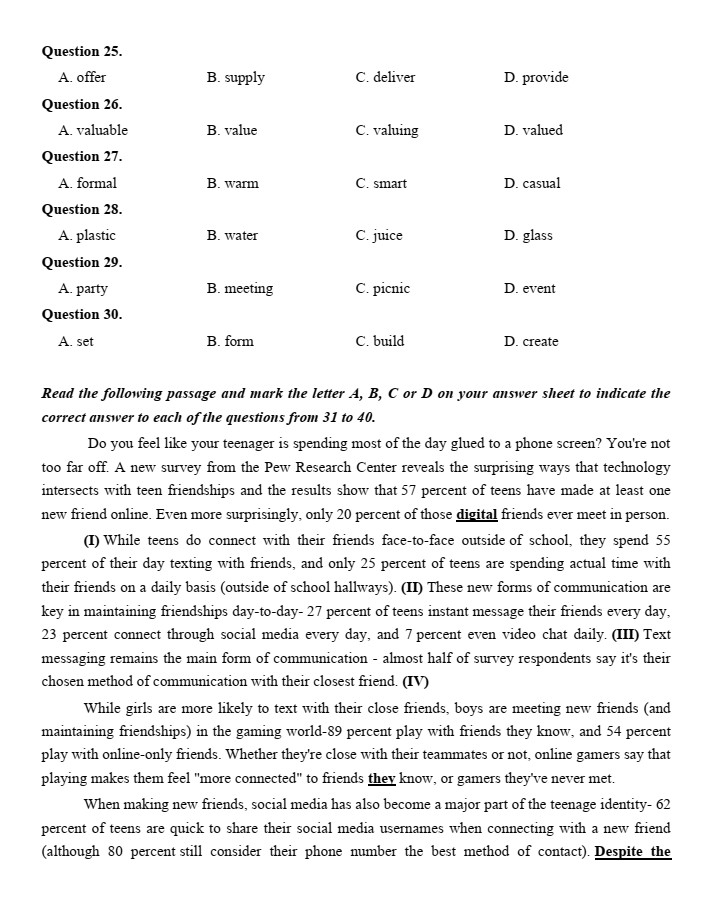
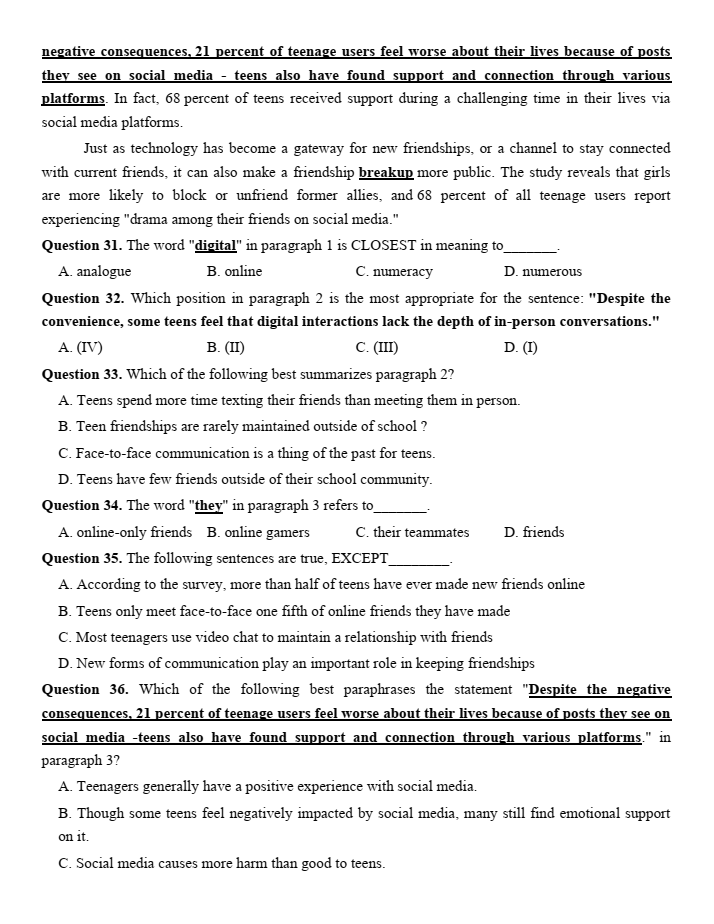
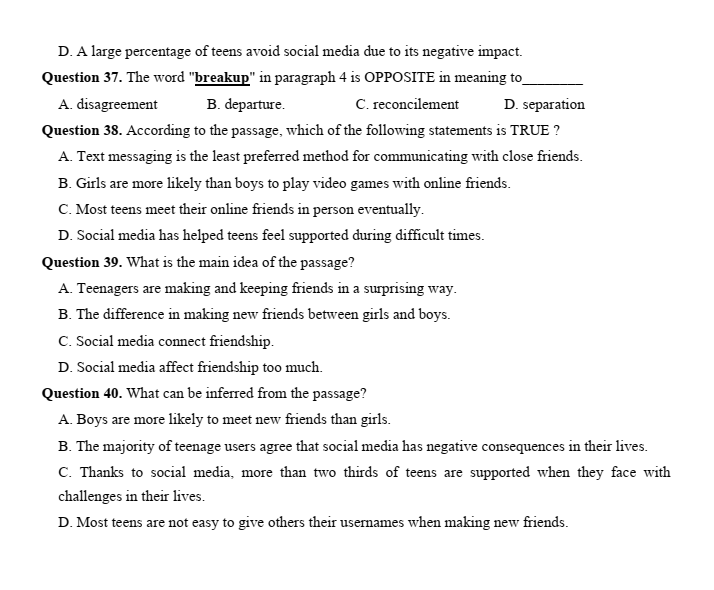
Mark the letter A, B, C, or D on your answer sheet to indicate the correct option that best fits each of the numbered blanks from 1 to 5.
Education is a cornerstone of personal and societal development, (1) ______, skills, and perspectives necessary to navigate and contribute to the world. It goes beyond the classroom, shaping character, fostering critical thinking, and promoting lifelong learning. Quality education is a powerful tool for breaking the cycle of poverty, empowering individuals (2) ______. In an interconnected global society, (3) ______ and tolerance, fostering a more harmonious world. Recognizing the transformative potential of education (4) ______, equitable, and prosperous communities that thrive on the principles (5) ______, innovation, and collaboration.
Question 1: individuals with the knowledge, skills, and perspectives necessary to navigate and contribute to the world.
A. individuals with the knowledge
B. providing individuals with the knowledge
C. individuals with the knowledge is provided
D. provides individuals with the knowledge
Question 2: empowering individuals _____.
A. to add complexity to family and societal relationships
B. complexity to family and societal relationships to be added
C. adding complexity to family and societal relationships
D. add complexity to family and societal relationships
Question 3: In an interconnected global society, _____ and tolerance, fostering a more harmonious world.
A. promotes education understanding
B. promoting education understanding
C. education promotes understanding
D. understanding education promotes
Question 4: Recognizing the transformative potential of education _____ equitable, and prosperous communities that thrive on the principles of knowledge, innovation, and collaboration.
A. is essential for building inclusive
B. building inclusive is essential
C. essential for building inclusive
D. building inclusive is essential for
Question 5: communities that thrive on the principles _____, innovation, and collaboration.
A. to know
B. knowledge
C. of knowing
D. of knowledge
Question 6: Which of the following could be the best title for the passage?
A. Different sources of energy: Advantages and Disadvantages.
B. Different sources of energy are limited.
C. Mining fossil fuel can bring harm to the environment.
D. We don’t use much of different sources of energy.
Question 7: Which of the following is NOT true about fossil fuel?
A. Its sources are limited.
B. We don’t use much of it.
C. Mining fossil fuel can bring harm to the environment.
D. It can pollute the air.
Question 8: All of the following are true about nuclear accidents EXCEPT _____.
A. their effects can last many years
B. it doesn’t take us much time to clean up the nuclear waste from the accident
C. there were serious nuclear accidents in Ukraine in 1986 and in Japan in 2011
D. they have been very serious
Question 9: The word “advantages” in paragraph 2 is OPPOSITE in meaning to_____.
A. dislikes
B. benefits
C. emergences
D. drawbacks
Question 10: The phrase “clean up” in paragraph 3 is closest in meaning to_____.
A. remove
B. activate
C. block
D. disappear
Question 11: What does the word “They” in paragraph 4 refer to?
A. supporters
B. officials
C. protesters
D. countries
Question 12: According to the passage, thanks to nuclear power _____.
A. some countries are in no need to buy as much oil from other countries.
B. no ships can use it to operate for a long time.
C. many people can use nuclear power in their homes.
D. some governments can exploit the natural resources in large quantities.
Question 13: What can be inferred from the passage?
A. We should consider seriously nuclear power because it has both advantages and disadvantages.
B. Some governments are wrong when they are using nuclear energy.
C. We can continue using nuclear energy until there is an accident.
D. Many people don’t want nuclear power in their countries and governments should follow their people.
Mark the letter A, B, C, or D on your answer sheet to indicate the correct arrangement of the sentences to make a meaningful conversation/paragraph/ letter in each of the following questions from 14 to 18.
Question 14.
Dear John,
a. When we look at the positive aspect of social media, we find numerous advantages.
b. Firstly, it is a great device for education.
c. Moreover, live lectures are now possible because of social media, so you can attend a lecture happening in America while sitting in India.
d. Most importantly, it also provides a great platform for young budding artists to showcase their talent for free.
e. Betty
f. Best wishes.
A. a-b-c-d-e-f
B. a-f-b-c-d-e
C. a-f-b-c-d-e
D. a-f-b-e-d-c
Mark the letter A, B, C, or D on your answer sheet to indicate the best arrangement of sentences or utterances to make a meaningful exchange or text in each of the following questions from 14 to 18.
Question 14:
a. happening in America while sitting in India.
b. Most importantly, it also provides a great platform for young budding artists to showcase their talent for free.
c. Best wishes.
d. For most, it is like watching the news as it is
e. Students can educate themselves on various topics using social media.
f. I have been researching the use of social media and find it incredible that one can see what is
A. a-b-c-d-e-f
B. a-b-f-c-d-e
C. a-f-b-c-d-e
D. f-a-d-e-b-c
Question 15:
a. Additionally, such intergenerational interactions promote the transfer of invaluable knowledge and experiences, enriching the overall societal tapestry.
b. Furthermore, engaging in open dialogues across generations facilitates the exchange of diverse ideas, contributing to a more inclusive and harmonious community.
c. Bridging the generation gap is a multifaceted journey that presents both challenges and opportunities.
d. Firstly, bridging the generational divide fosters mutual understanding, allowing younger and older individuals to share perspectives and insights.
e. Ultimately, embracing the generational diversity becomes a catalyst for personal growth, fostering a culture of respect and collaboration that transcends age differences.
A. a-c-d-a-b
B. c-d-a-b-e
C. c-a-c-d-b-e
D. c-a-b-d-e
Question 16.
a. Also, volunteering helps students connect with the community, making them aware of the needs around them.
b. Additionally, students develop such important skills as teamwork and communication ones while they volunteer.
c. Firstly, students who do voluntary work gain valuable real-world experience which can help in their future careers.
d. Finally, doing volunteer work can be a rewarding experience, as students feel good about helping others.
e. High school students benefit from doing voluntary work in many ways.
A. e-a-c-b-d
B. c-a-b-d-e
C. c-e-a-b-d
D. e-c-a-b-d
Question 17.
a. Hoa: Sure. First, select the type of event you want to attend.
b. Hoa: Then, click on the “Register” button and fill in your details.
c. Lan: OK, I’ve selected the event. What should I do next?
d. Lan: Can you help me register for the conference online?
e. Lan: Great, I’m all set! Thanks for your help.
A. c-b-d-a-e
B. a-e-d-b-c
C. d-b-a-e-c
D. d-a-c-b-e
Question 18.
a. My sister is driving me crazy! We had a big fight and now we’re not talking.
b. That’s a good idea. Thank you.
c. What’s the matter?
d. She keeps taking my things without asking me and it really bothers me.
e. What happened?
f. Don’t worry. Just talk to her and explain how you feel.
A. a-c-e-d-f-b
B. c-a-e-d-f-b
C. c-b-e-d-f-a
D. e-a-c-d-b-f
Read the following leaflet and mark the letter A, B, C or D on your answer sheet to indicate the option that best fits each of the numbered blanks from 19 to 24.
CELEBRATING TRADITIONAL HOLIDAYS WORLDWIDE!
Let’s explore how traditional holidays bring people together!
Facts and Figures:
A significant number of (19)_____ have special holidays that showcase their history and values. For example, (20)_____ people celebrate Christmas, while others participate in the Chinese New Year, which features family reunions and lively parades. These (21)_____ foster a strong sense of community and belonging.
Positive Action!
♦ Discover different holidays! Gaining knowledge about various festivals, such as Diwali or Ramadan, can help us recognize and value cultural diversity. (22)_____ focusing solely on our own traditions, we can broaden our perspectives and learn from others.
♦ Take part in local festivities! Getting involved in community events can deepen friendships and encourage unity among (23)_____ groups.
♦ Share your own customs! Invite friends to join your holiday celebrations, as this promotes understanding and respect among different cultures. Embracing traditional holidays (24)_____ to our lives and brings us closer together!
Question 19.
A. traditions
B. heritage
C. customs
D. cultures
Question 20.
A. little
B. another
C. much
D. many
Question 21.
A. celebrations
B. developments
C. observances
D. donations
Question 22.
A. Instead of
B. On behalf of
C. On account of
D. In terms of
Question 23.
A. deposit
B. Pollute
C. contaminate
D. diverse
Question 24.
A. drops back
B. looks out
C. gives back
D. breaks down
Read the following advertisement and mark the letter A, B, C, or D on your answer sheet to indicate the correct answer to each of the questions from 25 to 30.
EXCITING VOLUNTEER OPPORTUNITY: JOIN US!
Are you looking for a meaningful way to spend your free time? Join our upcoming Community Cleanup Event and make a difference!
This event is perfect for people of all ages who are passionate about protecting the environment. The cleanup will take place at Sunshine Park on Saturday, from 8:00 a.m. to 12:00 p.m. Volunteers will work together to remove trash, plant trees, and create a cleaner, greener community.
No experience is needed, and we provide all the necessary tools and equipment. We’ll also (25)_____ you with refreshments and snacks to keep you energized!
Why volunteer with us?
• Meet new people who share the same interests.
• Gain (26)_____ experience in community service.
• Help make the world a better place!
Remember to wear (27)_____ clothing and comfortable shoes for outdoor activities. Don’t forget to bring your (28)_____ bottle to stay hydrated throughout the day.
At the end of the event, we’ll have a small (29)_____ to celebrate everyone’s hard work and dedication.
This is your chance to share stories, enjoy light refreshments, and (30)_____ new friendships!
Don’s wait – register today! Sign up by emailing us at volunteer@cleanup.com or calling (123) 456-7890.
Together, we can make a difference!
Question 25.
A. offer
B. supply
C. deliver
D. provide
Question 26.
A. valuable
B. value
C. valuing
D. valued
Question 27.
A. formal
B. warm
C. smart
D. casual
Question 28.
A. plastic
B. water
C. juice
D. glass
Question 29.
A. party
B. meeting
C. picnic
D. event
Question 30.
A. set
B. form
C. build
D. create
Read the following passage and mark the letter A, B, C, or D on your answer sheet to indicate the correct answer to each of the questions from 31 to 40.
Do you feel like your teenager is spending most of the day glued to a phone screen? You’re not too far off. A new survey from the Pew Research Center reveals the surprising ways that technology intersects with teen friendships and the results show that 57 percent of teens have made at least one new friend online. Even more surprisingly, only 20 percent of those digital friends ever meet in person.
(I) While teens do connect with their friends face-to-face outside of school, they spend 55 percent of their day texting with friends, and only 25 percent of teens are spending actual time with their friends on a daily basis (outside of school hallways). (II) These new forms of communication are key in maintaining friendships day-to-day- 27 percent of teens instant message their friends every day, 23 percent connect through social media every day, and 7 percent even video chat daily. (III) Text messaging remains the main form of communication – almost half of survey respondents say it’s their chosen method of communication with their closest friend. (IV) While girls are more likely to text with their close friends, boys are meeting new friends (and maintaining friendships) in the gaming world-89 percent play with friends they know, and 54 percent play with online-only friends. Whether they’re close with their teammates or not, online gamers say that playing makes them feel “more connected” to friends they know, or gamers they’ve never met.
When making new friends, social media has also become a major part of the teenage identity- 62 percent of teens are quick to share their social media usernames when connecting with a new friend (although 80 percent still consider their phone number the best method of contact). Despite the negative consequences, 21 percent of teenage users feel worse about their lives because of posts they see on social media – teens also have found support and connection through various platforms.
Just as technology has become a gateway for new friendships, or a channel to stay connected with current friends, it can also make a friendship breakup more public. The study reveals that girls are more likely to block or unfriend former allies, and 68 percent of all teenage users report experiencing “drama among their friends on social media.”
Question 31. The word “digital” in paragraph 1 is CLOSEST in meaning to _____.
A. analogue
B. online
C. numeracy
D. numerous
Question 32. Which position in paragraph 2 is the most appropriate for the sentence: “Despite the convenience, some teens feel that digital interactions lack the depth of in-person conversations.”?
A. (IV)
B. (II)
C. (III)
D. (I)
Question 33. Which of the following best summarizes paragraph 2?
A. Teens spend more time texting their friends than meeting them in person.
B. Teen friendships are rarely maintained outside of school ?
C. Face-to-face communication is a thing of the past for teens.
D. Teens have few friends outside of their school community.
Question 34. The word “they” in paragraph 3 refers to _____.
A. online-only friends
B. online gamers
C. their teammates
D. friends
Question 35. The following sentences are true, EXCEPT _____.
A. According to the survey, more than half of teens have ever made new friends online
B. Most teens only meet face-to-face one fifth of online friends they have made
C. Most teenagers use video chat to maintain a relationship with friends
D. New forms of communication play an important role in keeping friendships
Question 36. Which of the following best paraphrases the statement “Despite the negative consequences, 21 percent of teenage users feel worse about their lives because of posts they see on social media – teens also have found support and connection through various platforms.” in paragraph 3?
A. Teenagers generally have a positive experience with social media.
B. Though some teens feel negatively impacted by social media, many still find emotional support on it.
C. Social media causes more harm than good to teens.
D. A large percentage of teens avoid social media due to its negative impact.
Question 37. The word “breakup” in paragraph 4 is OPPOSITE in meaning to _____.
A. disagreement
B. departure
C. reconcilement
D. separation
Question 38. According to the passage, which of the following statements is TRUE ?
A. Text messaging is the least preferred method for communicating with close friends.
B. Girls are more likely than boys to play video games with online friends.
C. Most teens meet their online friends in person eventually.
D. Social media has helped teens feel supported during difficult times.
Question 39. What is the main idea of the passage?
A. Teenagers are making and keeping friends in a surprising way.
B. The difference in making new friends between girls and boys.
C. Social media connect friendship.
D. Social media affect friendship too much.
Question 40. What can be inferred from the passage?
A. Boys are more likely to meet new friends than girls.
B. The majority of teenage users agree that social media has negative consequences in their lives.
C. Thanks to social media, more than two thirds of teens are supported when they face with challenges in their lives.
D. Most teens are not easy to give others their usernames when making new friends.
Mục đích tổ chức kỳ thi Đại học năm 2025 là gì?
Căn cứ theo quy chế hiện hành của Bộ Giáo dục và Đào tạo và các văn bản hướng dẫn tổ chức kỳ thi Đại học năm 2025, mục đích của kỳ thi là:
– Đánh giá kết quả học tập của học sinh sau 12 năm học theo yêu cầu của chương trình giáo dục phổ thông.
– Lấy kết quả thi để xét công nhận tốt nghiệp trung học phổ thông và làm căn cứ tuyển sinh đại học, cao đẳng.
– Góp phần đánh giá chất lượng giáo dục của địa phương và cả nước, làm cơ sở điều chỉnh nội dung, phương pháp dạy học trong nhà trường.
Thí sinh thi Đại học năm 2025 có bắt buộc thi môn Tiếng Anh không?
Theo quy định hiện hành của Bộ Giáo dục và Đào tạo và hướng dẫn tổ chức kỳ thi tốt nghiệp Đại học năm 2025, thí sinh dự thi phải thực hiện như sau:
– Thi 3 môn bắt buộc: Toán, Ngữ văn và Ngoại ngữ.
– Ngoài ra, thí sinh phải chọn một trong hai bài thi tổ hợp: Khoa học Tự nhiên (gồm các môn Vật lí, Hóa học, Sinh học) hoặc Khoa học Xã hội (gồm các môn Lịch sử, Địa lí, Giáo dục công dân – dành cho học sinh học chương trình giáo dục phổ thông).
Trong số các môn thi, Tiếng Anh là một trong ba môn thuộc bài thi Ngoại ngữ bắt buộc, thí sinh phải thi môn Tiếng Anh như một môn bắt buộc, không phụ thuộc vào lựa chọn bài thi tổ hợp hay mục đích xét tuyển đại học.
Như vậy, kỳ thi Đại học năm 2025 bắt buộc thí sinh phải thi môn Tiếng Anh.
